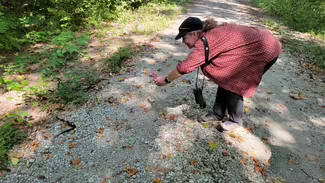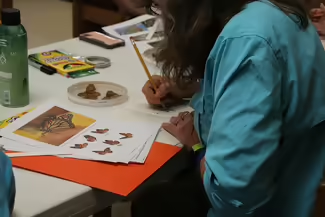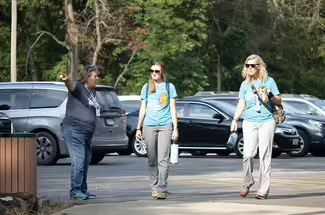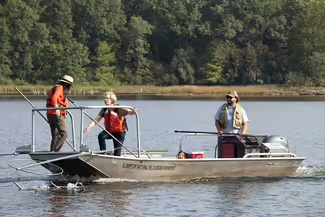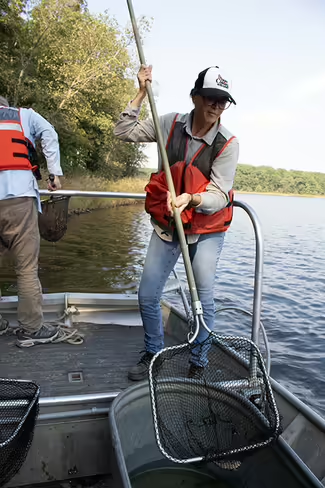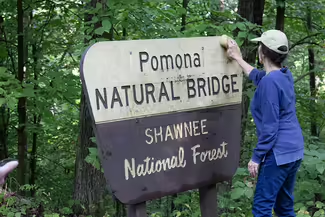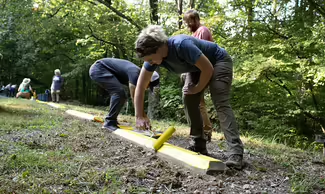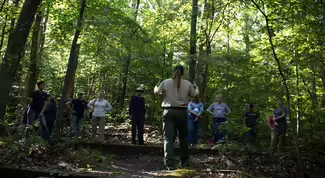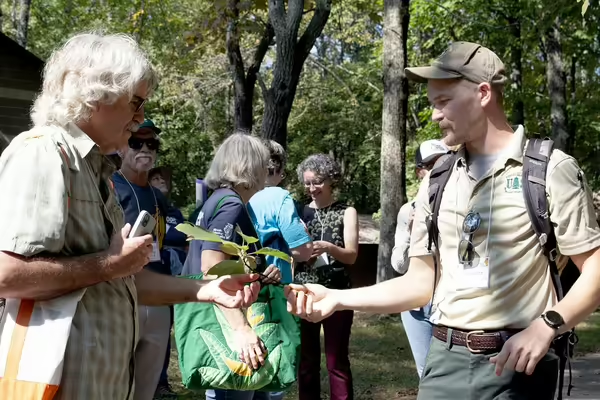
URBANA, Ill. — “Take a hike” takes on a new meaning when you go on a field trip with a Master Naturalist. You could be in a forest identifying plants when a bird call overhead has someone ask, “What was that?” You could be having an honest conversation about how to make outdoor spaces more inclusive. You could even be scooping fish out of a lake into a tank on a boat to help track aquatic wildlife populations.
Around the state and in your backyard, University of Illinois Extension Master Naturalists connect communities with the natural world, sharing their knowledge and talents and putting research into action. Recently, more than 100 Extension volunteers and staff headed south for the annual Master Naturalist State Conference to connect and gain new skills, tools, and programs to bring back home.
“Being a Master Naturalist is all about the next generation,” said Coles County Master Naturalist Terry Smith between conference sessions. “I’ve planted a lot of trees, and I probably won’t get a chance to be under the shade of those trees, but it’s for the generations to come. I see a lot of stuff going away that’s precious, and I hope we can protect and restore those things for our grandchildren.”
Set among the bluffs, forests, and lakes of Southern Illinois’ natural landscape and hosted at Touch of Nature in Makanda, the two-day event included a keynote presentation on native plants by the Illinois Botanizer Chris Benda, hands-on sessions, service projects, and regional field trips. Benda – who is a naturalist, photographer, author, and teacher – shared his passion for the natural areas of Illinois by enthusiastically presenting photos and stories of his work surveying plants around the state.
Participants then explored sessions including bird watching, plant identification, climate change, inclusivity, citizen science projects, nature journaling, an Underground Railroad site in Southern Illinois, and more.
On day two, participants headed out on a field trip of their choosing to search Snake Road for migrating reptiles, hike Pomona Natural Bridge, tour SunnySide Acres native seed farm, canoe Lake Murphysboro State Park, or explore geological features at Millstone Bluff and Millstone Lake.
The conference was hosted by the local Extension offices in Franklin, Jackson, Perry, Randolph, and Williamson counties. Event coordinators included natural resources, environment, and energy Educator Erin Garrett, horticulture Educator Kim Rohling, Program Coordinator Anne Townsend, and the local Master Naturalist volunteers.
Master Naturalists learn about botany, environmental ethics, archaeology, climate, forestry, geology, prairies, mammals, birds, insects, urban and agricultural systems, and more from University of Illinois experts. They then share their time and expertise through local environmental stewardship projects such as invasive species removal, restoration projects, wildlife monitoring, and more.
The Master Naturalist program is offered through Illinois Extension offices around the state. Learn more about how to become an Illinois Master Naturalist and bring positive change to your community’s natural areas at extension.illinois.edu/mn.
Photos: By Emily Steele, Heather Willis, and Bob Stamps
Illinois Extension leads public outreach for University of Illinois by translating research into action plans that allow Illinois families, businesses, and community leaders to solve problems, make informed decisions, and adapt to changes and opportunities. Illinois Extension is part of the University of Illinois Urbana-Champaign College of Agricultural, Consumer and Environmental Sciences.
